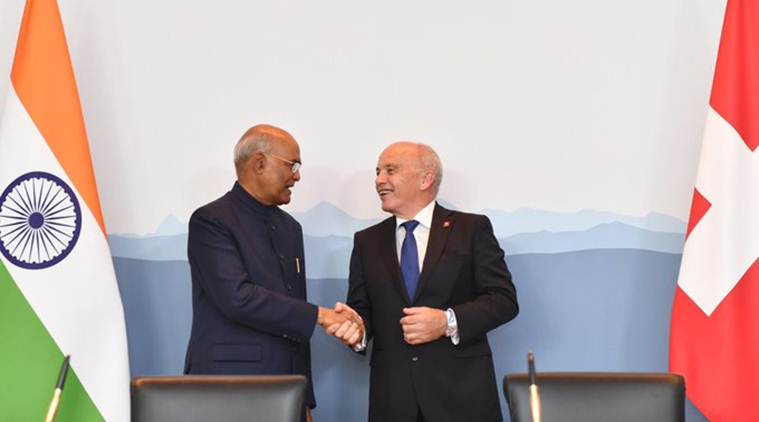
On his recent State visit to Iceland, Switzerland and Slovenia, President Ram Nath Kovind was accompanied by three full secretaries to the Government of India. Apart from the concerned secretary from the IFS, Sanjay Kothari, the President’s Secretary, and E L S N Bala Prasad, the President’s Special Secretary, went with him. Prasad was promoted in April from additional secretary to full secretary. Prasad, a 1986 Bihar-cadre IAS officer, has had probably the most rapid series of promotions of any senior civil servant. He was elevated from director-level rank to joint secretary to additional secretary and secretary in the span of less than a year. Prasad’s proximity to Kovind goes back to the time when he was principal secretary to Kovind when the latter was Bihar governor.
Slanging Match
There was a slanging match at the CPI office in Ajoy Bhavan recently. Atul Anjan, national secretary of the CPI, demanded that Kanhaiya Kumar, the party’s much publicised candidate from Begusarai in the last Lok Sabha elections, submit a detailed report of his election expenses, which was long overdue. Kanhaiya was furious at being ticked off.
Seven-Star Style
Gujarat Bhawan in Chanakyapuri was one of the more run-down state bhawans in the Capital. But Gujarat has now outdone every state in India with its new bhawan in Delhi, Garvi Gujarat, which Prime Minster Narendra Modi inaugurated this month. The six-storey marble mansion designed in the style of an old Gujarat haveli with modern touches, resembles a boutique seven-star hotel. Built at a cost of Rs 128 crore, it tastefully showcases Gujarat’s artisanship. There are delicately carved marble jalis, old-style arches, an imitation stepwell pond and a smoked skylight which changes colour. The brilliantly coloured marble inlay flooring replicates the design of Kutchi embroidery and Patola saris. Well-equipped conference halls, as well as a solar power plant and sewage treatment plant to conserve water provide a modern touch. The suites for the government officials are on a par with any swanky hotel. The Gujarat government has sensibly outsourced the housekeeping and kitchen to private parties.
The bhawan is built on 7,066 square metres of land, which belonged to the Delhi Land and Development Office. Whether a multi-storey building should have been permitted in the heritage Lutyens zone is of course a debatable point. The bhawan is across the road from the Congress headquarters, which looks rather dilapidated in contrast.
His Master’s Voice
Some mistakenly attribute the sudden departure of the Prime Minister’s principal secretary Nripendra Misra to his differences with Ajit Doval over Kashmir. In fact, the indication that Misra,74, would step down was evident in June itself when Narendra Modi granted Cabinet-rank status to not just Misra, but also additional principal secretary Pramod Kumar Mishra. Even during Modi’s first tenure as PM, although Misra was the senior of the two secretaries, it was the low-key PK who held the important portfolios, such as appointments. PK’s advantage is that he had worked closely with Modi earlier. He was Modi’s first principal secretary when he was Gujarat chief minister. After retiring as agriculture secretary in Delhi, PK had continued to work for the Gujarat government. Misra, on the other hand, was unknown to Modi when he joined the PMO in 2014, and was chosen because of his familiarity with the Capital’s power structure, since Modi was new to Delhi. PK’s strength is that he intuitively knows what his boss desires and seldom imposes his own opinion.
Still Another Mile
Seventy-two-year-old Maoist ideologue Kobad Ghandy has been in jail for 10 years with nearly two dozen criminal cases filed against him all over the country, mostly under the vague Unlawful Activities (Prevention) Act. He has been shuttled around as a non-political prisoner to various jails, despite his serious medical condition, which requires hospitalisation. In April, it had seemed as if Ghandy’s ordeal might finally end. He had obtained bail or been acquitted in the numerous cases against him. But matters can get complicated in our criminal justice system. The Jharkhand authorities refused to free Ghandy even after his release order, because the Surat police suddenly sent word that there was a production warrant for a case pending against him since February 2010. Though Ghandy wrote repeatedly starting November 2016 to the Surat court asking that the production warrant in the Gujarat matter be forwarded to expedite the case, he received no response. The Hazaribagh police, meanwhile, kept Ghandy in prison for several months claiming there was no escort available to take him to Surat. It should normally be a simple matter for Ghandy to get bail in the Surat case. He is the only one of the 24 accused not yet out on bail. But nothing, unfortunately, has been easy or straightforward about Ghandy’s decade-long incarceration.